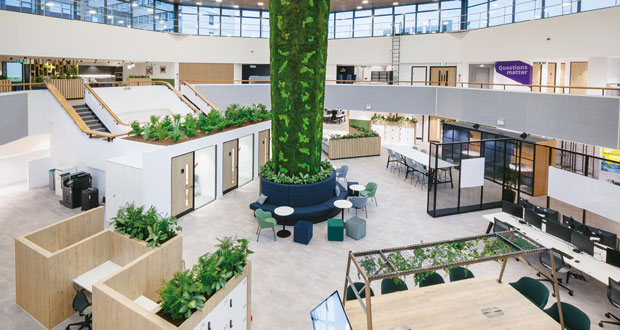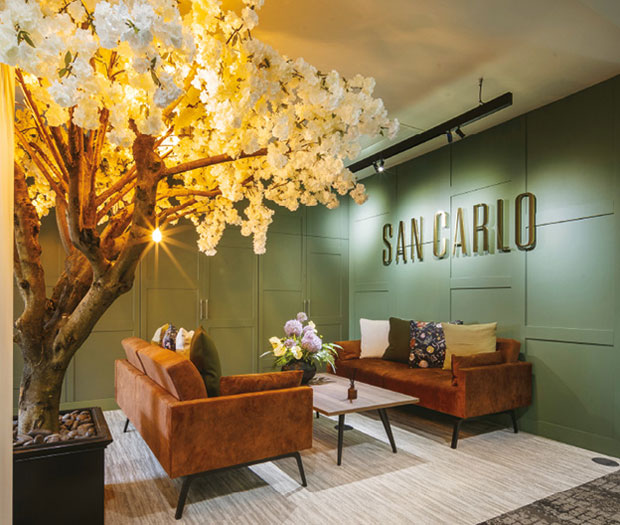
 Workplace flexibility is crucial in empowering people and protecting business. Patrick Ames, Design Director and Becky Turner, Workplace Psychologist from Claremont present FMJ with advice and examples of what is required to succeed
Workplace flexibility is crucial in empowering people and protecting business. Patrick Ames, Design Director and Becky Turner, Workplace Psychologist from Claremont present FMJ with advice and examples of what is required to succeed
Employees want more flexibility from their employers and workplaces – yet many businesses may be on a path to deliver the opposite. A survey from the end of 2023 suggested that 40 per cent of companies only use half of their office space, and three-quarters will reduce office square footage this year.
Nationwide interior design and fit-out business Claremont helps businesses across the UK create hybrid-ready work environments and sees a very different picture. As a proponent of organisational and workplace flexibility it fears some organisations are yet to embrace the new role of the workplace.
Patrick Ames explains: “The office is now widely recognised as an investment in people. While the pandemic might have made some organisations re-evaluate whether they needed their real estate at all – what it’s really done is make the workplace metamorphosis into something more valuable to the business.
“It should now be a flexible hub where people visit for the positive face-to-face employee experiences they can’t get at home and for a ‘brand shot’ so they feel connected to their employer. This is reflected in the broader range of people involved with workplace decisions – it isn’t just facilities and finance; it now includes HR, marketing, IT and diversity personnel. Together, these professionals have the power to deliver the positive experiences that keep employees happy, healthy, motivated and loyal.”
Hybrid working has sparked new flexible behaviours and, therefore, a new blueprint for how the workplace is used and designed. Ames elaborates: “We regularly see that Tuesdays to Thursdays are busier than Mondays and Fridays thanks to remote working – so occupancy might be 70 per cent one day and 10 per cent on another. Straight away, you can see that reducing space would destroy the flexibility and employee choice that has become so important post-pandemic.
“We have seen numerous professional services businesses mandating a return to the office, sometimes for as many as three days each week. Midweek office occupancy is back at pre-pandemic levels; quieter Fridays and Mondays are decreasing the average occupancy figure. As more organisations mandate people to return – a decision largely based on improving culture and collaboration – demand for space and a wider range of workplace amenities will increase. Organisations need flexible workspaces to accommodate this.”
WHY DOES WORKPLACE FLEXIBILITY MATTER?
Change is a business constant, so workplaces must pivot and adapt as organisations require. Generally, workplaces must accommodate changes in working practices as technology evolves or headcount alters. But, they must also be flexible for users and how they work.
Claremont’s in-house Workplace Psychologist Becky Turner, MSc, explains. “With hybrid working the norm for many businesses, employers must understand why their people visit the office and the tasks and work they complete when they’re there. With people coming and going at different times and choosing shared workspaces for tasks as varied as training, quiet study and collaboration – workspaces must have built-in flexibility.”
Faced with the great resignation and a shortage of talent globally, employers are under pressure to find and retain the best people and keep them engaged, supported and productive. Shockingly, only 15 per cent of people are engaged at work, which means employers must do more. Says Turner: “The workplace can be a powerful tool to help turn the tide.”
Flexible workplaces also provide a better way for organisations to access all parts of the labour market and support diversity and inclusion. Says Turner: “Workforces aren’t a homogenous mass of people – they comprise different groups with distinct needs, feelings, working styles and expectations. We’re all now talking about the importance of supporting menopausal women in the workplace and how to better aid employees with neurodivergent needs, for example. Creating quiet spaces that support these groups helps to make the workplace inclusive and supportive. Flexible workplace design is how you provide equity of experience for everyone.”






